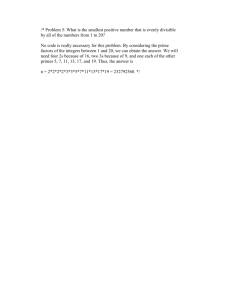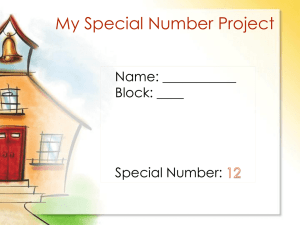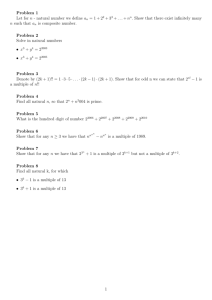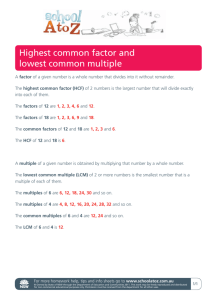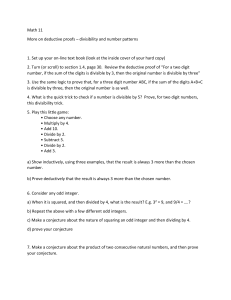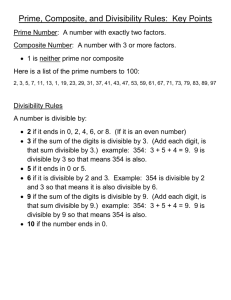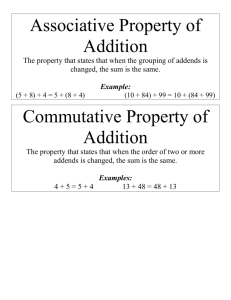Remedial - MoreMaths
advertisement
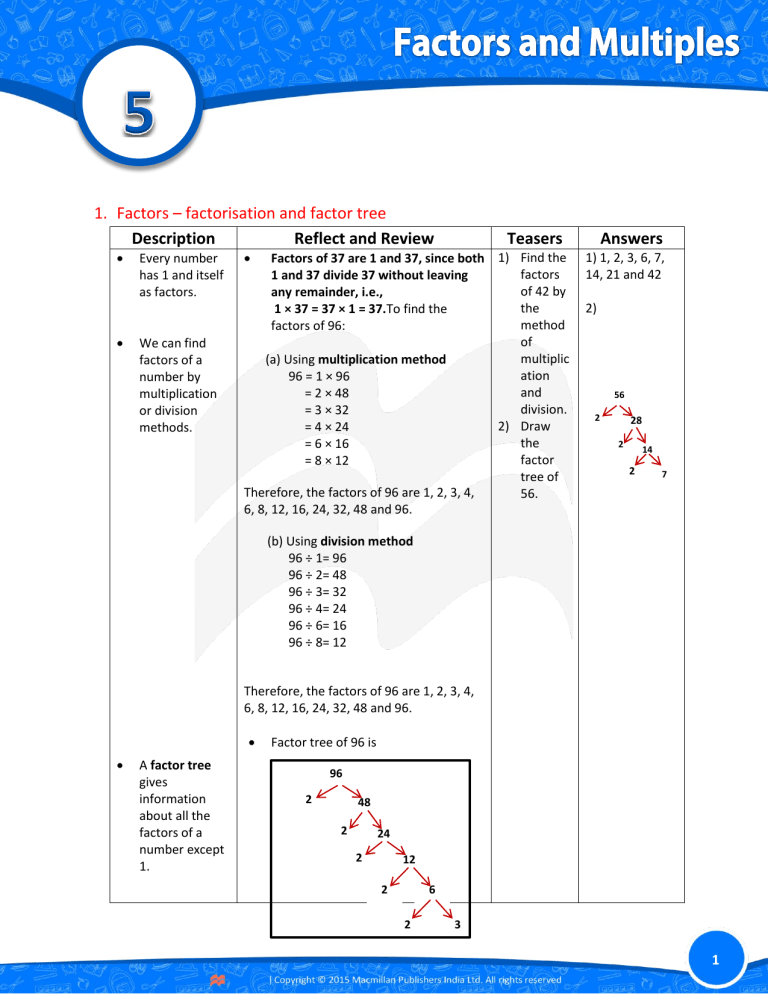
1. Factors – factorisation and factor tree Description Reflect and Review Every number has 1 and itself as factors. We can find factors of a number by multiplication or division methods. Teasers Factors of 37 are 1 and 37, since both 1) Find the factors 1 and 37 divide 37 without leaving of 42 by any remainder, i.e., the 1 × 37 = 37 × 1 = 37.To find the method factors of 96: of multiplic (a) Using multiplication method ation 96 = 1 × 96 and = 2 × 48 division. = 3 × 32 2) Draw = 4 × 24 the = 6 × 16 factor = 8 × 12 tree of Therefore, the factors of 96 are 1, 2, 3, 4, 56. 6, 8, 12, 16, 24, 32, 48 and 96. Answers 1) 1, 2, 3, 6, 7, 14, 21 and 42 2) 56 2 28 2 14 2 7 (b) Using division method 96 ÷ 1= 96 96 ÷ 2= 48 96 ÷ 3= 32 96 ÷ 4= 24 96 ÷ 6= 16 96 ÷ 8= 12 Therefore, the factors of 96 are 1, 2, 3, 4, 6, 8, 12, 16, 24, 32, 48 and 96. A factor tree gives information about all the factors of a number except 1. Factor tree of 96 is 96 2 2 48 96 24 2 12 2 6 2 3 1 2. Common factors and HCF Description A number is said to be a common factor of two or more numbers if it is a factor of each of the given numbers. HCF (Highest Common Factor) of two or more numbers is the greatest common factor of the given numbers. Reflect and Review Teasers To determine the common factors and hence the HCF of 48 and 72: 1) Find the HCF of 28 and 35. 2) Find the HCF of 24 and 15. 48 = 1 × 48 = 2 × 24 = 3 × 16 = 4 × 12 =6×8 The factors of 48 are 1, 2, 3, 4, 6, 8, 12, 16, 24 and 48 Answers 1) 7 2) 3 72 = 1 × 72 = 2 × 36 = 3 × 24 = 4 × 18 = 6 × 12 =8×9 The factors of 72 are 1, 2, 3, 4, 6, 8, 9, 12, 18, 24, 36 and 72. Common factors of 48 and 72 are 1, 2, 3, 4, 6, 8, 12 and 24. Out of these, 24 is the greatest. Thus, 24 is the HCF of 48 and 72. 3. Prime and Composite numbers; Even and Odd numbers Description Reflect and Teasers Review 2 Numbers which have only two 11, 13, 17, 19, 23 1) The number Answers 1) 2 factors, 1 and itself, are called Prime numbers, whereas all other numbers which have more than two factors are called Composite numbers. 1 is neither prime nor composite, as it has only one factor, which is itself. A number which leaves 0 as remainder when divided by 2 is Even number and which leaves 1 as remainder is Odd number. 4. Multiples Description The multiples of a number are found by multiplying it with any counting number. Every number is a multiple of itself. A number is said to be a common multiple of two or more numbers if it is a multiple of each of the given numbers. LCM (Least Common Multiple) of two or more numbers is the smallest common multiple of the given numbers. and 29 are the prime numbers between 10 and 30. 1 = 1 × 1, so 1 has only one factor.2, 4, 6, 8, ....., 20 are ten even numbers from 1 to 20. 1, 3, 5, 7, ….., 19 are ten odd numbers from 1 to 20. which is even and also prime is ______. 2) Write a number which is odd and also composite. ______ 3) Write a number which is even and also composite. ______ 4) Write a number which is odd and also prime. ______ Reflect and Review Teasers To determine the common multiples and hence the LCM of 12 and 15: 1) Find the first 3 common multiples of 3 and 4. 2) Find the LCM of 24 and 32. Multiples of 12: 12, 24, 36, 48, 60, 72, 84…. 2) 9 3) 12 4) 7 Answers 1) 12, 24 and 36 2) 96 Multiples of 15: 15, 30, 45, 60, 75, 90, 105…. Out of these, 60 is the smallest. Thus, the LCM of 12 and 15 is 60. 3 5. Divisibility rules of 2, 5 and 10. Description Reflect and Review A number is divisible by another number if the second number is a factor of the first number, or we can say that a number is divisible by another number if division of the first number by the second leaves no remainder. Following are the Divisibility Rules of 2, 5 and 10: 4 Divisibility by 2: A number is divisible by 2 if the digit at the ones place of the number is 0, 2, 4, 6 or 8. Divisibility by 5: A number is divisible by 5 if the digit at the ones place of the number is 0 or 5. Divisibility by 10: A number is divisible by 10 if the digit at the ones place of the number is 0. Check the divisibility with 2, 5 or 10 for the following numbers: 35, 67, 40, 56, 108, 28, 69, 110. Numbers divisible by 2: 40, 56, 108, 28, 110 …since the last digit of each of these is either 0, 2, 4, 6, 8 or 0. Numbers divisible by 5: 35, 40, 110 …since the last digit of each of these is either 0 or 5. Numbers divisible by 10: 40, 110 …since the last digit of each of these is 0. Numbers not divisible by 2, 5 or 10: 67, 69 …since none of the divisibility rules are fulfilled. Teasers Answers 1) Find which of the following numbers are divisible by 2, 5 and 10. 345, 239, 340, 4006, 231, 325, 1014, 4000 Divisible by 2: 340, 4006, 1014, 4000 Divisible by 5: 345, 340, 325, 4000 Divisible by 10: 340, 4000
